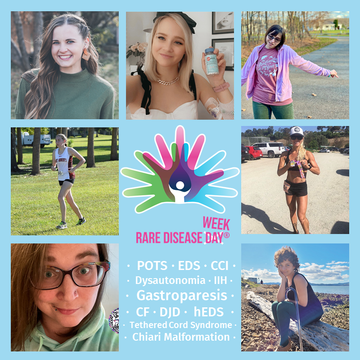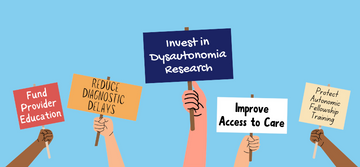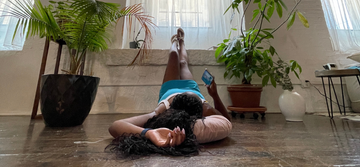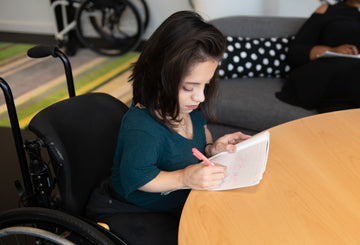
February 28th is Rare Disease Day -- a day dedicated to raising awareness for the 300 million people across the globe who live with rare diseases. Due to the rarity of many diseases, treatment options and medical representation are oftentimes neglected, making it harder for patients and their loved ones to get the treatment and attention they deserve.
On this Rare Disease Day, we're sharing the stories of several people living with rare or invisible illnesses to help shed much-needed light on the challenges faced by millions across the world.
VOICES IN THE COMMUNITY
We recognize that voices within this community are often neglected, so we reached out to a few of our friends with various forms of dysautonomia to share their stories and provide tips for people who want to learn more about chronic and invisible illnesses. We are extremely grateful for their willingness to share their personal stories and insights below.

AIMEE ESTHER – A happy, productive, meaningful life in the midst of pain
Hi. I am Aimee Esther. I have Postural Orthostatic Tachycardia Syndrome (POTS), and several other chronic illnesses that cause me daily pain and fatigue. I suffered for years with no answers. I went to various doctors with the hopes of finding answers and coming up short. Finally, I was diagnosed with POTS and everything made sense. I was able to find many things to help control my symptoms, such as extra salt + water, certain exercises, changing my diet, changing the way I sleep, and several other things. My symptoms aren't gone but simply having answers and a name for my condition helps me immensely.
I may not be able to live a ‘normal’ life as those around me, but I still live a pretty amazing life. I am now living a happy, productive, meaningful life in the midst of pain.
You can follow Aimee’s journey on Instagram at @aimee_esther or her YouTube channel here! www.youtube.com/aimeeesther

FERN ERHARD -- Balance
The trickiest part is the balance of both managing the symptoms and dealing with people's preconceived ideas about invisible illnesses.
You can follow Fern’s inspiring journey on Instagram at @fern.andforest

KRISTIN BURKE – Balancing EDS and Elite Marathon Running
Pain is not always visible to the human eye.
When I was a little girl my elbow would dislocate all the time! They called it ‘nurses maid arm’. As I grew older, my elbow stopped dislocating, but I started to have pain throughout my body. I played club soccer and softball until I was 17. Injuries stopped me from playing any longer.
When I was in my early 20s, I had horrible shoulder and neck pain. After my first shoulder surgery, the doctor came in after the surgery and told me “as soon as we knocked you out, you shoulder dislocated and fell on the operating table”...
He basically told me I would have to have surgeries every few years to fix it!
After several doctors, misdiagnoses and multiple surgeries, I finally found that one doctor that actually gave me answers I thought I’d never get. He knew exactly what I had just by pulling my skin! A rare genetic syndrome called Ehlers-Danlos Syndrome stage 1 & 3. It’s a connective tissue and hypermobility disorder. My shoulder dislocates after it’s been stretched to its limits.
This syndrome has also attacked my cervical spine. On top of having EDS, I have Disc Degeneration Disease (DJD), I have no “marshmallow” in between my discs. So my discs collapse.
I’ve had 24 major surgeries in the last 7 years. The most recent were a disc replacement and knee repair in 2020.
I live in pain every single day! I’ve had to accept that I will have to take pain meds to get through the day and have surgeries the rest of my life, but I will NEVER give up on pushing myself to achieve my goals!
My biggest goal I set last year (Feb 2020) was to Boston quality my first ever marathon, and with lots of hard work, I did just that!
Never give up, keep pushing!

VANESSA MATELSKI – Navigating an ever-changing normal
POTS symptoms vary patient-by-patient, day-by-day, and even moment-by-moment! We have to learn how to navigate an ever-changing normal while embracing the good moments and coping with the bad ones as best we can.

LINDSAY MURRAY – You never know what someone is going through, so please always be patient and kind
Happy Rare Disease Day! My name is Lindsay, and I am a POTS and Gastroparesis chronic illness warrior. These illnesses have greatly changed the way I live my life as well as so many other people have their lives impacted by these conditions every day. Just a friendly reminder that you never know what someone is going through, so please always be patient and kind. Not all disabilities are visible."
Vitassium has been a huge life saver as one of the supplements that I take to help regulate and minimize my POTS symptoms. From brain fog to nausea, fatigue, vomiting, dizziness and more! These are symptoms people with POTS deal with daily, and Vitassium helps me get some relief.

MCKAY THOMPSON - Chronic means chronic. Invisible illnesses are real.
This is what I wish people knew about EDS & POTS. It’s not a choice or something that you can make disappear with willpower. It’s a medical condition. A chronic illness. Chronic means chronic. No amount of exercise, yoga, or positive thinking will make either of them go away. I want people to know that just because I look like a very healthy, happy, 21 year old, that I have so many silent struggles you will never see. Invisible illnesses are real.❤️
You can follow McKay on TikTok @chronically_sick_ and subscribe to her YouTube channel here!

KATIE GULL – Listening to our bodies
POTS and hEDS don’t prevent me from being active, but a genuine consideration in sports and life is ‘is this regular pain or a message to take a break?’ Chronically ill individuals aren’t incapable, we’re just listening to our bodies and sometimes that means we can’t do it but often it makes us more dedicated to.
I’ve lived my whole life with Hypermobile Ehlers-Danlos Syndrome (hEDS) and POTS. While I wasn’t diagnosed until late childhood, my whole life has been dictated by my physical state. My hEDS means I have constant joint pain and have to be more cautious about injuries to name a few effects, my POTS means I have to make sure I have high electrolyte levels constantly to maintain proper blood flow to my brain. Because of early intervention by my mom, I’ve been able to participate in sports my whole life, but often not to the same level or extent as others. I missed over half of my high school varsity cross country seasons due to injuries, but still managed to compete in the state series each time. Fortunately, my coaches were aware of my illnesses and didn’t treat me any differently than any of the other athletes, even when I spent countless practices in the trainer’s office instead of on the track. Individuals with chronic illnesses are just as capable of anything as anyone else if our body is feeling well at that specific moment. We take the signals our bodies send us very seriously and if that means that we need to spend all day in bed, then that’s what we need. The best way to support a chronically ill individual is to simply listen to what they’re telling you. Otherwise, we do pretty well on our own. This rare disease day, check in on how your chronically ill friends are doing, just the same way you’d check in on anyone else. And if you want to go above and beyond, maybe do some research and educate yourself on some rare diseases! If not, thanks for listening to my thoughts, it means a lot.

BRAYDEN MERRILL -- Proper Electrolytes
I never let my Cystic Fibrosis slow me down. With the proper electrolyte and sodium levels through the help of salt stick, I can live my life to the fullest and be my best self!
Follow Brayden on Instagram here: @braydenmerrill

JACQUIE FISHER -- I may be rare, but I'll never be quiet
I have Ehlers-Danlos syndrome (EDS), postural orthostatic tachycardia syndrome (POTS), Craniocervical Instability (CCI), Tethered Cord Syndrome, Idiopathic Intracranial Hypertension (IIH), and Chiari Malformation. You cannot SEE any of these conditions by looking at me. In fact, I LOOK like a perfectly healthy 30-something. No one would ever know how sick I am. Until the pain brings me to my knees because my joints won’t stay in place. Until I lose consciousness in the middle of a group of people because my brain isn’t getting enough oxygen. Until I use a motorized cart at the grocery store because I’m too fatigued to make it through the store. Until I stare mindlessly in the middle of a conversation because brain fog stole my next words right out of my mouth.
My entire world has been rocked by so many rare conditions that I don’t have a single doctor who understands it all. I’m complicated and messy and so medically frustrating. But I am still a pretty amazing human being. In spite of and because of my rare conditions, I am a gifted writer who feels more compassion for people than they sometimes deserve. I am a loving mom and a kind friend. I am sick. But it’s because I am sick that I’ve learned that value that each and every day holds. And it’s because I am sick that I learned how powerful my voice is. I may be rare, but I will never be quiet. #RareDiseaseAwareness
Follow Jacquie on Instagram at @spoonful_of_stripes and check out her blog at Spoonful of Stripes

ARTHUR DREW CASTRO -- Sharing stories is vital
Chronic illness warriors sharing their stories is vital to continuing medical research on these conditions. There’s been some misinformation circulating in articles stating that POTS is a “woman condition” and that is certainly not true! POTS is an autonomic nervous system dysfunction that can affect anyone.
I would like to dedicate this to a very rare disease called PANDAS it stands for Pediatric Autoimmune Neuropsychiatric Disorders Associated with Streptococcal Infections.
When I was younger I got PANDAS and I developed Tourettes. I started ticking and then developed OCD. Not many know that disease can induce psychological affects but it can and all of this was due to strep throat getting caught in my blood stream. If you have strep throat I strongly encourage you to get it treated and look into PANDAS if your child or you experience Tourette’s or OCD symptoms following after a strep infection.
I can’t thank @Vitassium and @therealsaltstick enough for creating SaltStick Vitassium to manage my POTS symptoms. I also am so grateful to the POTS community for welcoming me in with open arms when I was scared and alone looking for answers and for someone to understand. Yes I know I have many conditions, it’s hard for me to keep up with them myself. Writing, photography, and running @fairestmagazine is what helps keep me afloat.
Follow Arthur at @arthurdrewcastro and check out his magazine Fairest Magazine!

If you would like to learn more about dysautonomia, check out Dysautonomia International
Vitassium is a medical food specifically formulated to provide sodium and potassium for the clinical dietary management of dysautonomia and other chronic conditions, when increased plasma volume has been shown to be beneficial. If you would like to learn more about Vitassium and and the discounts we offer to people living with chronic conditions, check out our Vitassium Club here.








